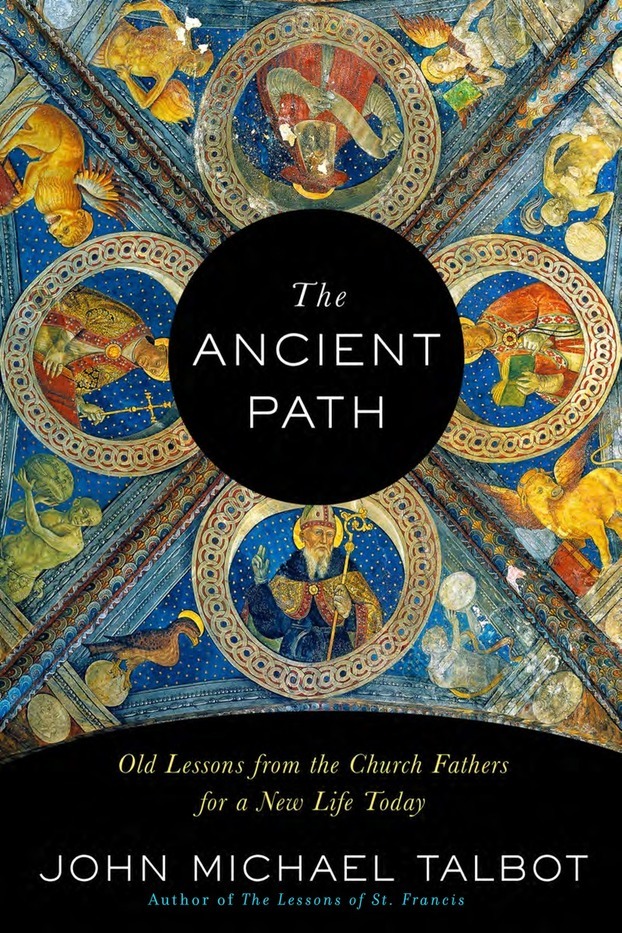John Michael Talbot’s new book The Ancient Path: Old Lessons from the Church Father for a New Life Today caught my eye for two reasons. First, I grew up listening to his music as my mom had most of his CDs (including those he recorded with Michael Card). Second, one of the things that attracted me to the Catholic Church, as I began asking questions and reading more about it eight years ago, was how ancient most of the teachings were. Ideas that were new to me had been discussed by the Church fathers within a few centuries of Jesus’ death.

Still, as I began to read, I was prepared for a somewhat dry topic. I mean, the Church Fathers were writing two thousand years ago. About stuff that’s been settled and over for about that long. Right? I was pleasantly surprised to discover I was wrong about both counts. Talbot has a gift for spinning a story (I should have expected that from his music!) and he does just that around his life and the works of the Ancient Fathers, bringing these men and their writing alive and showing how the issues they wrote about so many years ago are still relevant and interesting today.
Talbot weaves the story of the Church Fathers around his own life, telling how he grew up in the turbulent 60s, started his musical career, married young, and then crashed. He found himself at a local Franciscan monastery, putting his life back together and asking questions he never expected to ask.
He found answers in the men who followed the men who followed Jesus. Often, throughout the book, Talbot talks about the close ties the Ancient Fathers had to Jesus and His disciples. These men were living right after the events of the New Testament, struggling to apply what they’d learned to their daily lives and to ensure that the faith was passed on accurately:
“My explorations gradually led me to an intensive study of the earliest Christian documents outside the Scriptures—the writings of the men we call the Apostolic Fathers. I pored over these, as I wanted to see the Church in its primitive purity. I wanted to see how the disciples of the apostles lived the teachings I found in the Acts of the Apostles. Clement of Rome, after all, had sat at the feet of Peter and Paul. Ignatius had succeeded Peter as bishop of Antioch. Polycarp had received the faith from John.”
Each chapter in the book, while covering a chapter of Talbot’s life, also covers a specific topic. Talbot discusses community, internal prayer, and public work. He shares about the influence of bishops, from the days of the early Father to his own life as he establishes a new community. He discusses stewardship and charity. In all the chapters, he shows how many of the ancient threats to the Church—the arguments and topics that the Church Fathers were writing about—are still being hurled at the Church today.
“Scripture was written and compiled by the Church, so it is rightly interpreted in the context of the Church from which and through which it came. To isolate Scripture from its source is to cut off from the living stream of the Spirit. When we keep it connected to its source we solve many of the modern challenges to the apostolic faith that are really only ancient errors in modern clothes.”
Part autobiography, part apologetics, part exegesis, The Ancient Path: Old Lessons from the Church Fathers for a New Life Today is an incredibly readable, thought-provoking book that every Catholic—and everyone asking questions about the Catholic Church—should read and have in their library.
John Michael Talbot was born into a musical Methodist family in the 1950s. He dropped out of school at age 15 to join a rock band, then encountered the Jesus Movement and began recording Christian music. He joined the Catholic Church in 1978 and in 1980 founded a Catholic community of celibate brothers and sisters, families and singles. He has won several music awards and is also a respected author who has written 25 books. In 2014, he premiered an inspirational TV show, “All Things Are Possible.” To learn more about Talbot or his books and music, visit his website.

No Responses Yet